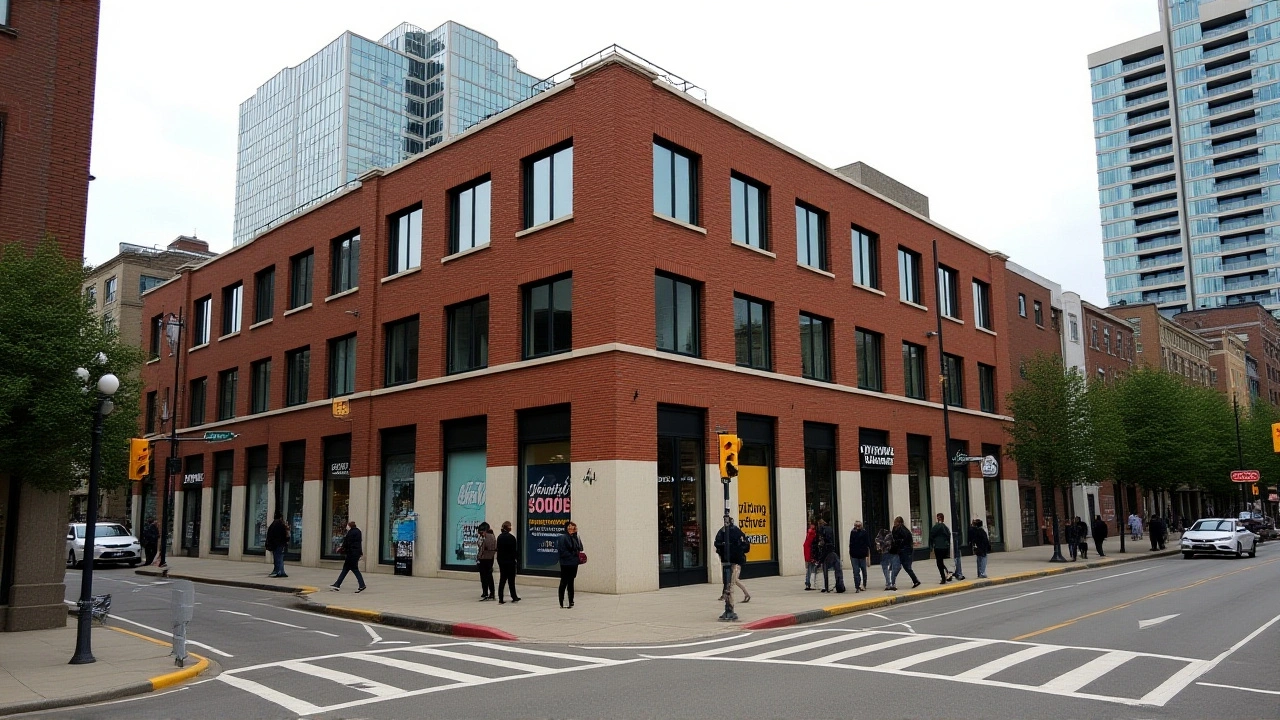When Michèle Boudria, CEO of McDonald's Canada, sat down with Ottawa Mayor Mark Sutcliffe over breakfast on November 7, 2025, she didn’t just talk about fries and coffee. She talked about redemption. After two years of silence since the infamous ByWard Market location shuttered, Boudria confirmed McDonald’s Canada plans to return to the heart of downtown Ottawa — when the time is right.
Why the ByWard Market Matters — and Why It Was Lost
The original McDonald’s at 99 Rideau Street wasn’t just any restaurant. Opened in 1985, it became a cultural landmark — and a nightly flashpoint. For 38 years, it served families, students, and late-night revelers. But after bars closed, the crowd changed. Rowdy groups spilled onto the sidewalk. Noise complaints piled up. By 2023, the Ontario government’s Keeping Communities Safe from Crime Act, 2022 (Bill 3), which allowed bars to stay open until 3 a.m., had turned the area into a magnet for post-last-call chaos. The Toronto Star dubbed it the "World’s Worst McDonald’s." The decision to close in May 2023 wasn’t just business — it was survival.The building itself, the heritage-designated Atwood structure from 1908, is protected under the Ontario Heritage Act. Its lease went to a new Asian eatery in January 2025, but Boudria made it clear: McDonald’s hasn’t given up. "We didn’t walk away because we didn’t care," she said. "We walked away because we couldn’t serve the community the way we wanted to."
Five New Locations — And a Strategic Re-Entry
By November 2026, McDonald’s Canada plans to open five new restaurants across Ottawa, targeting growing suburbs like Barrhaven, Kanata, and Orleans. But the real signal? The company is watching the Ottawa Police Service’s ByWard Market Task Force — formed in January 2023 — like a hawk. If noise bylaws are enforced consistently, if late-night crowds are managed without police intervention, then 99 Rideau Street could reopen. "It’s not about timing," Boudria told reporters afterward. "It’s about trust. And trust has to be earned, not assumed."That’s not just PR. McDonald’s Canada operates 1,441 restaurants nationwide, with 95% owned by independent franchisees. In Ottawa alone, there are 58 locations. The company’s global push — to hit 50,000 restaurants by December 31, 2027 — means Canada remains one of its top five international markets. But in cities like Ottawa, reputation matters more than square footage.
The Bigger Picture: $100 Million in Kind
While the ByWard Market return hangs in the balance, McDonald’s Canada is quietly building something far more enduring. The Ronald McDonald House Charities (RMHC) Canada facility at 1235 Smyth Road in Ottawa will expand from 14 to 36 family units — a 57% increase — with construction set to begin in Q2 2026 and finish by Q4 2027. The funding? Not corporate dollars. Not government grants. It’s all from franchisees."It’s largely due because our franchisees are raising a lot of money to be able to do that," Boudria said, her voice thick with pride. The 2025 McHappy Day campaign on May 7 raised $8.9 million CAD, bringing the campaign’s total since 1977 to a staggering $100 million. That’s not a number. That’s 100,000 families who didn’t have to sleep in hospital hallways while their children fought cancer or serious illness.
The new RMHC building will be carbon-neutral, aligning with McDonald’s Canada’s 2050 net-zero goal — a target validated by the Science Based Targets initiative in 2022. It’s a quiet counterpoint to the noise of the old Rideau Street location. One building was torn down because it caused chaos. Another is being built to bring peace.
What This Means for Ottawa
This isn’t just about burgers. It’s about how a global brand navigates local pain. McDonald’s Canada didn’t just close a store — it acknowledged a failure. Now, it’s asking for a second chance. And in return, it’s investing deeply in the community’s well-being. The expansion of RMHC, the quiet monitoring of noise enforcement, the patience to wait for trust — these are signs of maturity.For residents who remember the late-night fights outside the old location, the return might feel risky. But for parents who’ve stayed at RMHC while their kids underwent treatment, it’s a lifeline. And for the franchisees who raised that $8.9 million? They’re not just selling food. They’re building community.
What’s Next?
Ottawa City Council will review the ByWard Market Task Force’s Q1 2026 report in March. If crime and noise complaints drop below 2022 levels, McDonald’s could begin renovations by summer 2026. Meanwhile, the new RMHC expansion is already in design phase. The company says it will host a public consultation in early 2026 — not just to inform, but to listen.There’s a lesson here: Sometimes, the most powerful business move isn’t opening more stores. It’s knowing when to wait.
Frequently Asked Questions
Why did McDonald’s close its ByWard Market location in 2023?
McDonald’s closed its 99 Rideau Street location in May 2023 after years of escalating late-night disturbances tied to bar closures in the ByWard Market area. The Ontario government’s 2022 bill allowing bars to stay open until 3 a.m. worsened the problem, leading to noise complaints, public safety concerns, and the infamous "World’s Worst McDonald’s" label from the Toronto Star. The closure was a strategic decision to preserve community relations.
How is McDonald’s Canada funding the RMHC expansion?
The 22-unit expansion of Ronald McDonald House Charities Canada’s Ottawa facility is fully funded by franchisee contributions, not corporate funds. The 2025 McHappy Day campaign alone raised $8.9 million CAD, part of the $100 million total raised since 1977. This reflects the deep community commitment of local owners who operate 95% of McDonald’s Canada’s 1,441 restaurants.
When could McDonald’s reopen in ByWard Market?
McDonald’s Canada has not set a firm date, but officials say reopening hinges on measurable improvements in crowd management and noise enforcement by the Ottawa Police Service’s ByWard Market Task Force. A key milestone will be the Q1 2026 report from the task force. If crime and disturbance reports fall below 2022 levels, renovations could begin by summer 2026.
What makes the new RMHC facility different from the old one?
The new 36-unit facility at 1235 Smyth Road will be built as a carbon-neutral structure, meeting McDonald’s Canada’s 2050 net-zero emissions goal. It will also feature modern amenities like private family rooms, a dedicated kitchen, and quiet zones — improvements based on feedback from over 1,200 families served since 2015. The expansion nearly doubles capacity to support more families traveling for pediatric care.
How does McDonald’s Canada’s franchise model impact these decisions?
With 95% of Canadian locations owned by independent franchisees, local owners have direct influence on community investments and operational decisions. The RMHC expansion funding came from their donations, and the decision to delay ByWard Market’s return was shaped by their concerns over reputation and customer safety. This decentralized structure gives McDonald’s Canada both agility and deep community accountability.
Is McDonald’s Canada’s global expansion plan affected by this local strategy?
No — in fact, it reinforces it. McDonald’s aims to reach 50,000 restaurants globally by 2027, with Canada as one of its top five markets. But the company now prioritizes "quality over quantity" in urban cores. The Ottawa strategy — expanding in suburbs while waiting for the right moment to return downtown — sets a precedent for other cities facing similar challenges, showing that long-term brand trust can outweigh short-term growth targets.




It’s rare to see a corporation acknowledge failure with this much grace. Closing the ByWard location wasn’t weakness-it was responsibility. And now they’re rebuilding trust through action, not just PR. The RMHC expansion? That’s the real story. 100 million dollars in community care? That’s not marketing. That’s legacy.
Wait-so you’re seriously saying that McDonald’s, of all companies, is now a ‘community pillar’? Please. They closed the store because they were losing money on late-night customers, and now they’re pretending it’s about ‘trust’? And don’t even get me started on the ‘carbon-neutral’ RMHC-greenwashing with a side of McNuggets!
I don’t care how many zeroes are in that charity number. This is the same company that lobbies against minimum wage hikes, pushes sugary meals to kids, and still uses plastic packaging that takes 500 years to decompose. You can’t scrub away decades of exploitation with a shiny new building and a press release. This isn’t redemption-it’s reputation laundering. And don’t tell me franchisees are saints-they’re just the ones getting blamed when the corporate machine needs a scapegoat.
They’re not coming back. Not unless the cops start arresting rowdies, not just ticketing them.
One must observe the structural irony: a global conglomerate, historically synonymous with homogenized consumerism, now positions itself as a nuanced actor in urban sociology. The ByWard Market’s decay was not an aberration-it was the inevitable outcome of neoliberal urban policy. McDonald’s withdrawal was not a moral act, but a recalibration of brand equity in a post-liquor-law landscape. The RMHC expansion, while commendable, remains a strategic hedge against reputational erosion-albeit one that, paradoxically, achieves genuine social good.
They’re waiting for the cops to make it safe. But what if the cops are part of the problem? Did you know the Task Force is funded by a private security firm linked to a former police chief who used to work for a fast-food chain? This is all staged. The whole thing. They want you to think they’re changing… but they’re just moving the chaos elsewhere.
Let me get this straight-some corporation that sells deep-fried grease and sugar water is now the moral compass of downtown Ottawa? We’re supposed to be impressed that they’re not opening a store until the drunks stop throwing up on their sidewalks? Meanwhile, they’re building a fancy hospice for rich people’s kids while their own employees can’t afford healthcare. This isn’t redemption-it’s a masterclass in how to look good while doing the bare minimum.
One must consider the geopolitical implications of this narrative. The Canadian franchise model, while ostensibly decentralized, is still subject to U.S.-based corporate governance. The $100 million figure, while impressive, represents less than 0.2% of McDonald’s global annual revenue. The real question: Is this altruism-or a calculated effort to preempt regulatory intervention in urban zoning? The timing, coinciding with the 2026 municipal elections, is… suspicious.
Oh wow. A fast food chain finally figured out that people don’t like getting punched in the face outside their burger joint. Groundbreaking. And now they’re getting a gold star for donating money they were already going to donate? Please. The only thing more pathetic than the old location is this whole ‘redemption arc’ they’re selling.
can we just take a second to appreciate that people who run local mcdonald’s are literally raising money so families don’t have to sleep in hospital hallways?? like… this is the kind of thing that actually changes lives. yeah, the old spot was a mess. but this? this is the good stuff. the quiet, unglamorous, real kind of change. and honestly? i’m proud of them.
100 million? lol. where’s the audit? who’s verifying that? and why is the new building so fancy? i bet they’re gonna turn it into a corporate retreat for execs. this whole thing smells like a tax write-off. and don’t even get me started on the ‘carbon neutral’ claim-greenwashing with solar panels and guilt-trips.
I’ve stayed at RMHC when my sister was in chemo. I know what those rooms mean. I know what silence and a hot meal at 2 a.m. feel like. This isn’t PR. This is someone remembering what matters. The ByWard thing? Yeah, it was a mess. But the fact they’re waiting? That’s respect. That’s humility. And that’s rare.
It is a well-established fact that multinational corporations exploit local cultural capital to mask systemic inequity. The McDonald’s brand, while superficially engaging in philanthropy, remains structurally dependent on labor exploitation and environmental degradation. The RMHC expansion, though aesthetically pleasing, does not negate the company’s role in the commodification of childhood nutrition. One must consider the epistemological dissonance between symbolic charity and material harm.
Okay but what if the new location is haunted?? Like… the old one had a history. People said they heard crying in the freezer. And the building’s from 1908. That’s a lot of ghosts. And now they’re gonna rebuild it? Are they gonna do a blessing? A séance? I need to know if they’re gonna hire a medium. This is a horror movie waiting to happen.
Franchisees are the real MVPs here. Corporate doesn’t lift a finger-but the local owners? They’re the ones showing up. They’re the ones who know the neighborhood, the families, the kids who come in after school. This isn’t a corporate strategy-it’s a grassroots movement with a fryer. And honestly? That’s the only way this works.
They’re not coming back. 😔😭 They’re just gonna open a new one down the street and pretend the old one never happened. Classic. And the RMHC thing? Cute. But I still won’t buy a Big Mac. 🍔🚫
They closed the store because they didn’t want to deal with the poor people. Now they’re building a fancy house for rich people’s sick kids. So… they’re still only helping the ones who can afford to be seen? And they want a medal? No. Just no. This isn’t charity. It’s performance.
The entire narrative is a carefully constructed illusion. The ByWard Market’s decline was engineered by municipal neglect and deregulation of alcohol sales-both policies McDonald’s lobbied for. Now they’re posing as the solution. The RMHC expansion? A PR artifact designed to obscure their role in creating the very conditions that necessitated their withdrawal. This is not moral growth-it’s institutional gaslighting.
The $100 million figure? That’s not charity-it’s cultural capital. McDonald’s didn’t just raise money. They turned grief into goodwill, trauma into brand loyalty. And the quietest part? The franchisees didn’t do it for headlines. They did it because they’ve seen the kids. They’ve held the hands. They know what a warm bed at 3 a.m. means when the world feels like it’s ending. That’s not marketing. That’s humanity.